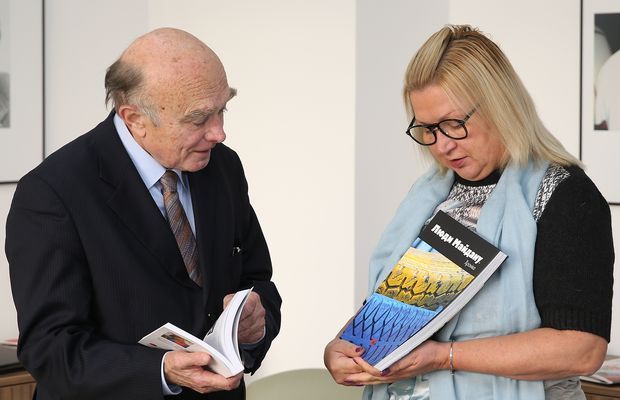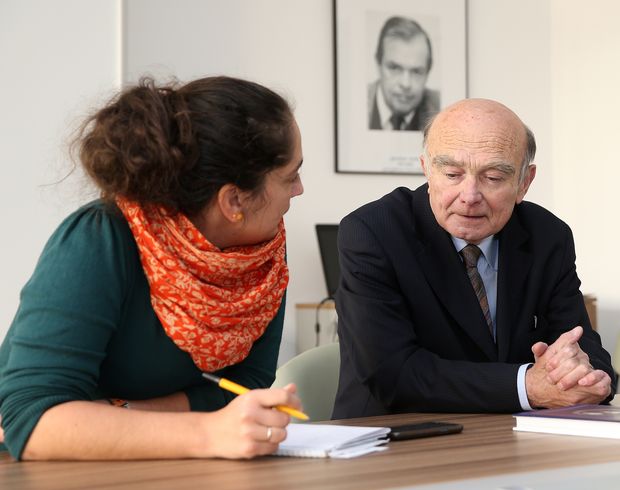A special story
Professor Stanislav Kulchytsky, our regular contributor, donates 10,000 dollars, the prize he received in Washington for his work about Holodomor, for the army. He entrusted Den with an important mission...
Recently Doctor of History, professor, and regular contributor to Den/The Day Stanislav Kulchytsky underwent a surgery on his heart. He stayed for a week in a resuscitation ward of the Mykola Amosov National Institute of Cardiovascular Surgery. His roommates were wounded ATO soldiers. Kulchytsky was many times an accidental listener to their stories “right from the hell.” When his condition improved and he was transferred from the resuscitation to a ward, he did two important things.
He wrote an article for Den in which he studies the in-depth reasons of the current events and new challenges to the humankind after the collapse of the Soviet communism, “A Three-Color Challenge to Humankind” (Den No. 167, September 10, 2014 and No. 169, September 12, 2014). He made a decision to donate the 10,000-dollar prize he received in 2011 from the Omelan and Tatiana Antonovych Foundation for his 25-year-long work on the topic of Holodomor. He asked our editorial office to be a partner in realization of this idea.
“Why did I come with this decision? I think many people decide to do like me. In 2011 I received a 10,000-dollar prize from the Omelan and Tatiana Antonovych Foundation for my research of Holodomor. I was saving the money for a rainy day, but I could do without it when this day came. Therefore I’m giving this money for the needs of the Ukrainian army. For the rainy day has come for my country. I am very satisfied that the money of the Ukrainian diaspora will come in handy in this turbulent time,” he said, “I was staying in a resuscitation ward for 15 people. Apart from me there were two women after a stroke and a heart attack, the rest were ATO soldiers. They had problems with vessels, not the heart. They were put on feet, someone was sent to Germany. I spent five days in the resuscitation and heard their stories. When I came out, I decided to donate the money for the army. Now these men are saving us. My family supported me, they have no other way out (smiling) – in these questions they are like me.”
Kulchytsky entrusted us with an extremely responsible mission – to choose those who will receive this money, the ones who badly need it today. This was quite a hard decision. We had several variants. In particular, we considered the possibility to divide between several volunteer groups. But after all we decided that it would be better to provide concrete soldiers with everything needed. We chose the soldiers of 8th Company of the 4th Battalion of the National Guard (military unit No. 3021), who are currently at the front. Recently after a mass shelling they lost most of necessary things: from footwear and uniform to night binoculars and medicaments, which simply burnt down. Apart from that, the commander of the company Viktor Ozhohin has for many years worked at senior posts in Dnipropetrovsk Oblast State TV and Radio Company. The mass media call his troop a journalist unit. So, it turned out to be an act of solidarity.
Kulchytsky sent the money to the Dnipropetrovsk volunteer Larysa Tokar who takes care of this battalion. “The volunteers are indeed working heroically, in all directions. Some people get something, other bring it to the frontline, they raise money, find necessary things even abroad,” the benefactor says, “Russia will always be stronger than Ukraine, and we have to, on the one hand, lead a cautious policy, and on the other hand, be prepared for the war, have everything needed for defense, everywhere: in Chernihiv and Kherson regions, and, most importantly, the Donbas. Hopefully, this money will help to buy the needed things for the soldiers. I wish them to take care of themselves and fight wisely.”

When he was asked why he chose Den, Kulchytsky replied: this is my trust. He emphasized that our newspaper is by far the only one where historians, he in particular, can publish their researches. Recently Kyiv Publishing House Tempora has published the three-volume monograph by Stanislav Kulchytsky Red Challenge, about the history of communism in Ukraine from its beginning till its end, which included many materials that were previously published in Den/The Day. “Apart from that namely you started this collection of stories of people who came through ATO and the ones who were killed,” the professor added.
“This war came unexpected for everyone. We all thought that after 1991, when totalitarian regime was defeated, democracy will be born. It was born. But I have written in my analyses, in Den in particular, about the way democracy is born and what Ukrainian prospects are. It happened so that half of Ukraine remained Soviet, with all the cities and all monuments to Lenin. The other half included the western regions, which were Sovietized 20 years later plus the center, which has been and continues to be the heart of intelligentsia. Three rounds of the presidential elections in 2004 and two rounds in 2010 clearly showed the division of the electorate: south-east and center-west. I have written that in 2015 there will be an election again, again an opposition, and this will be inevitable. But I never thought Russia would take such a way. And the thing is not merely about Putin, simply all these weeds that seemed to be pulled out suddenly started to grow. These ‘weeds of communism.’ Russia refused from the economic basis of communism, but the political organization remains the same. And in its qualities it is much more terrifying than it was in the time of Brezhnev or Khrushchev. Because there used to be a collective character. What is going on in Russia today is purely Stalin’s regime which has no limits for Putin, and this is very dangerous, because this is a nuclear state,” Kulchytsky told The Day.
However, he thinks that there are some positive moments. “The fact that we haven’t done anything over these 23 years and were proud of having a normal situation, totally different from Karabakh or Transnistria, has had shown up in a most severe and dangerous form. This is a challenge which should be answered. Therefore the development in our country was taking place in a matter of several months after nothing was done for many years in succession. Now the most important thing for us is to defend the political nation, the middle class we don’t have, and remove the oligarchs. This won’t be done soon, but we must do this. And the events in the east have speeded up these processes.”






